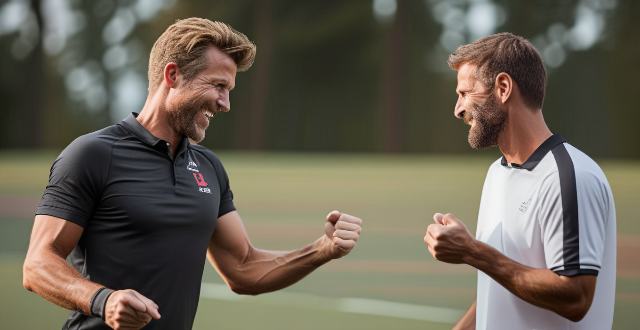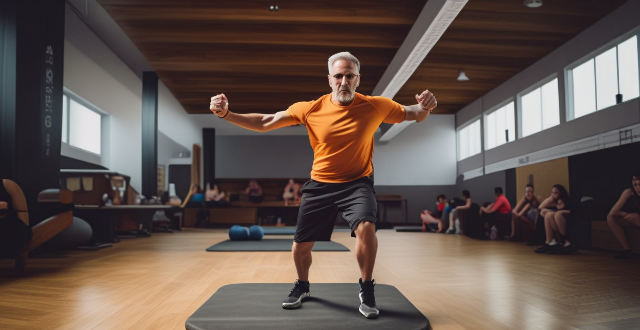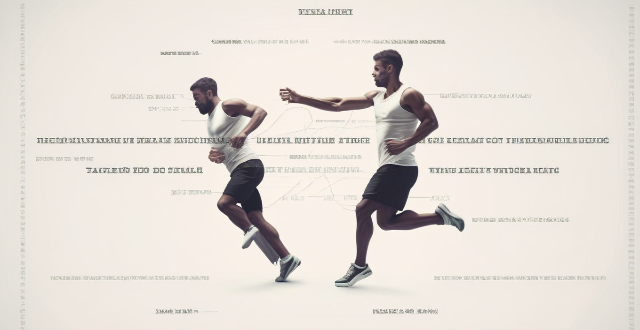Mental Performance

What role does mental preparation play in improving running performance ?
Mental preparation is key to improving running performance. It involves setting clear goals, using visualization techniques, practicing mindfulness exercises, and employing self-talk strategies. By training the mind to focus on the task at hand, manage stress, and maintain motivation, runners can enhance their physical performance and achieve their running goals.

What role does visualization play in sports performance ?
Visualization is a powerful tool that can enhance sports performance by improving focus, confidence, technique, recovery, and motivation. It involves creating mental images of desired outcomes or actions, which can lead to better concentration, increased self-efficacy, enhanced motor learning, reduced risk of injuries, and higher levels of motivation. By incorporating visualization into their training routines, athletes can strengthen their physical and mental capabilities, resulting in improved performance during competition and training.

How can mental training improve physical abilities in athletes ?
Mental training is crucial for athletes as it enhances physical abilities by improving focus, managing stress, and promoting a positive mindset. Techniques such as visualization, self-talk, and emotional intelligence contribute to better performance.

How does mental toughness impact athletic performance at a competitive level ?
In summary, this article explores the impact of mental toughness on athletic performance at a competitive level. It highlights the benefits of mental toughness, including enhanced focus and concentration, improved resilience and coping mechanisms, increased confidence and self-belief, and better decision making under pressure. The article also provides practical tips for developing these essential skills through mindfulness techniques, visualization, positive self-talk, scenario training, and continuous self-improvement. Overall, mental toughness is crucial for athletes to perform at their best and achieve success in their chosen sport.

How does sleep quality affect athletic performance and health ?
This text explains how sleep quality affects athletic performance and overall health. It emphasizes the importance of sleep for physical recovery, mental well-being, and immune system support in athletes. Poor sleep quality can lead to decreased performance, increased injury risk, and mental health issues. The text provides tips for improving sleep quality, such as establishing a consistent sleep schedule and creating a comfortable sleep environment. Adequate sleep is crucial for optimal athletic performance and overall health.

What is sports psychology and how does it impact athletic performance ?
Sports psychology is a specialized branch of psychology that focuses on how psychological factors influence athletic performance. It encompasses the study of athletes' motivation, mental preparation, concentration, confidence, team dynamics, and the psychological aspects of injury and recovery. By understanding these elements, sports psychologists help athletes enhance their performance, cope with stress, and achieve peak mental states for competition. The key areas of sports psychology include motivation, mental preparation, concentration, confidence, team dynamics, and injury and recovery. Motivation involves intrinsic and extrinsic motivation, as well as goal setting to improve focus and commitment. Mental preparation includes visualization and imagery, self-talk, and flow state. Concentration involves focus management and ignoring distractions. Confidence includes self-efficacy and mental toughness. Team dynamics involve group cohesion and role acceptance. Injury and recovery involve coping strategies for dealing with the emotional impact of injuries and maintaining motivation and positive mindset during rehabilitation. The impact of sports psychology on athletic performance is multifaceted, including enhanced performance through improved focus and increased resilience, mental health benefits such as stress reduction and boosted self-esteem, and team synergy through better communication and coping with pressure. Overall, integrating sports psychology into training regimes can help athletes cultivate the mental fortitude needed to reach their full potential and enjoy a healthier sporting lifestyle.

How can psychology improve an athlete's performance ?
The article discusses how psychology can improve an athlete's performance by addressing various psychological factors that can influence their mindset and behavior. The author provides a topic summary of the main points covered in the text, which includes goal setting, self-talk, stress management, confidence building, and team dynamics. Each section explains the objectives and benefits of each technique and how they can be applied to enhance an athlete's mental toughness, resilience, and winning mindset. The conclusion emphasizes the importance of incorporating psychology into an athlete's training regimen for overall well-being and enjoyment of sports.

What are the best ways to enhance athletic performance ?
Improving athletic performance involves a combination of physical, mental, and lifestyle factors. Here are some strategies that can help athletes reach their full potential: ## Physical Training ### Strength and Conditioning - Incorporating weight training helps build muscle strength and endurance. - Plyometrics exercises like box jumps and bounding improve power output, crucial for many sports. ### Technique and Drills - Perfect practice makes perfect; focusing on the quality of movements rather than just quantity. - Practicing game scenarios can enhance decision-making skills under pressure. ### Recovery - Light activities like walking or swimming can aid recovery. - Stretching and foam rolling help reduce muscle soreness and improve flexibility. ## Nutrition and Hydration ### Diet - Consuming a mix of proteins, carbohydrates, and healthy fats supports energy levels and recovery. - Drinking enough water is essential for maintaining performance and preventing cramps. ### Supplementation (When Needed) - Sports drinks during prolonged exercise can replenish electrolytes and provide energy. - Post-workout protein shakes can aid in muscle repair. ## Mental Preparation ### Visualization - Seeing yourself succeed in your mind's eye can boost confidence and focus. - Setting clear, achievable goals provides direction and motivation. ### Mindfulness and Stress Management - Meditation can reduce anxiety and improve concentration. - Controlled breathing can lower stress levels before and during competition. ## Lifestyle Habits ### Sleep - Athletes need adequate rest to recover physically and mentally. - Maintaining a consistent sleep schedule optimizes rest. ### Avoiding Negative Habits - Substances can impair judgment and harm performance. - High stress levels can negatively impact both physical and mental health.

Can reading about sports help improve one's own athletic performance ?
Reading about sports can enhance athletic performance by providing insights into techniques, strategies, and mental approaches. It helps in technique improvement, mental preparation, and injury prevention. To apply this knowledge, set clear goals, choose relevant resources, practice what you learn, and seek feedback for adjustments.

How can sport psychology counseling help athletes improve their performance ?
Sport psychology counseling is a specialized field that focuses on the mental and emotional aspects of athletic performance. It aims to enhance an athlete's mindset, motivation, and overall well-being to improve their sporting outcomes. Here's how it can be beneficial: Goal Setting and Motivation: Sport psychologists help athletes set Specific, Measurable, Achievable, Relevant, and Time-bound goals. This clarity in objectives boosts motivation and directs efforts toward improvement. Confidence and Self-Esteem Building: Coaching athletes to replace negative self-talk with positive affirmations enhances their confidence and self-belief. Anxiety and Stress Management: Techniques like deep breathing, progressive muscle relaxation, and mindfulness can reduce anxiety levels before and during competitions. Focus and Concentration: Improving an athlete's ability to focus on relevant cues and block out distractions is crucial for peak performance. Team Dynamics and Interpersonal Skills: Enhancing communication within teams fosters better cooperation and understanding among athletes. Mental Toughness and Resilience: By preparing mentally for setbacks, athletes learn resilience and are better equipped to handle difficulties when they arise. Recovery and Balance: Adequate rest is essential for physical recovery and maintaining mental sharpness. Sport psychologists can guide effective strategies. Helping athletes achieve a balance between their sport and personal lives prevents burnout and keeps them motivated.

Can sport-specific meditation or mindfulness practices improve performance and mental clarity ?
Sport-specific meditation and mindfulness practices can improve performance and mental clarity for athletes. These techniques offer benefits such as improved focus, reduced stress and anxiety, and enhanced recovery. Incorporating these practices into training regimens can help athletes achieve better results.

What are the key factors that contribute to high-level sports performance ?
High-level sports performance is determined by a combination of physical prowess, mental strength, tactical acumen, and favorable environmental conditions. Physical factors include strength and conditioning, flexibility and mobility, nutrition and hydration, and rest and recovery. Psychological factors encompass mindset and motivation, confidence and self-belief, mental toughness, and concentration and focus. Tactical factors involve technical skill, game intelligence, adaptability, and teamwork and communication. Environmental factors include training facilities, coaching staff, and support personnel. By addressing each of these factors through dedicated training and support systems, athletes can reach their full potential and achieve excellence in their chosen sport.

What role does visualization play in enhancing sport performance according to sports psychology ?
Visualization, also known as mental imagery or mental practice, is a technique used by athletes to enhance their performance. In sports psychology, visualization plays a crucial role in enhancing sport performance. Benefits of visualization include improved focus and concentration, increased confidence and self-efficacy, enhanced motor learning and skill acquisition, better emotional control and coping strategies, and improved recovery and rehabilitation. To use visualization effectively, set clear goals, create a mental image, practice regularly, combine with physical practice, stay positive, and seek professional guidance.

How do sports psychologists help athletes deal with performance anxiety ?
Sports psychologists use various techniques to help athletes manage performance anxiety, including assessment and goal setting, cognitive behavioral techniques, building mental toughness, establishing routines, fostering social support, and ongoing assessment. These strategies aim to enhance an athlete's mental resilience and enable them to perform optimally under pressure.

How can educational psychology aid in addressing students' mental health issues ?
Educational psychology can aid in addressing students' mental health issues by understanding the role of emotional intelligence, promoting a positive school climate, providing early intervention and support services, encouraging self-care and resilience, and facilitating collaboration between educators and mental health professionals.

How important is mental health in managing a sports career ?
This article discusses the importance of mental health in managing a sports career. It explains how mental health affects an athlete's performance, recovery, team dynamics, off-field success, and personal growth. The article emphasizes that athletes with good mental health are more likely to set goals, work hard towards achieving them, and push through challenges. It also highlights the role of mental health in developing life skills that extend beyond an athlete's sports career. Overall, the article underscores the significance of prioritizing mental well-being for athletes to maximize their potential both as individuals and members of their teams.

In what ways does mental health support impact overall women's health ?
This text discusses the importance of mental health support for women's overall health, highlighting its impact on physical health, emotional well-being, relationships, and work performance. It emphasizes that good mental health can reduce the risk of chronic diseases, improve sleep quality, and help manage pain. Additionally, it mentions how mental health support can enhance emotional well-being by reducing stress, improving mood, and increasing resilience. The text also points out that mental health support can strengthen relationships through improved communication, better emotional regulation, and greater empathy. Lastly, it notes that mental health support can enhance work performance by improving focus, reducing absenteeism, and increasing job satisfaction.

How do sports competitions influence stress levels and mental readiness ?
Sports competitions can significantly impact stress levels and mental readiness. Performance pressure, fear of failure, winning obsession, and physical exertion can increase stress levels, while confidence building, goal achievement, camaraderie, and mindfulness practices can decrease them. Similarly, focus and concentration, resilience, mental toughness, and visualization techniques can improve mental readiness, while overthinking, perfectionism, lack of self-belief, and external factors can impair it. Overall, sports competitions provide opportunities for growth, learning, and personal development but also present challenges that require effective coping strategies to manage stress levels and maintain mental readiness.

What role does mental training play in improving sports skills ?
The text discusses the role of mental training in enhancing sports skills. It outlines key points including mental toughness, visualization techniques, goal setting, self-talk, and concentration skills. Mental toughness helps athletes handle pressure, recover from setbacks, and persist through challenges. Visualization techniques can program the subconscious, reduce anxiety, and increase motivation. Goal setting clarifies objectives, tracks progress, and maintains motivation. Positive self-talk boosts confidence, enhances performance, and regulates emotions. Concentration skills block distractions, maintain attention, and improve decision making. The conclusion states that mental training is an essential component of overall athletic success.

What role does religion play in athletes' mental preparation for competitions ?
The role of religion in athletes' mental preparation for competitions is significant as it provides motivation, coping mechanisms, resilience, team cohesion, moral guidance, and spiritual fulfillment. Religion can serve as a source of inspiration and help athletes manage stress and anxiety. It also enhances their mental toughness and fosters unity among teammates. Moreover, religion guides athletes in making ethical decisions and offers spiritual fulfillment, contributing to their overall well-being. However, the impact of religion on athletic performance varies depending on individual beliefs and experiences.

How does lack of sleep impact athletic performance ?
The text discusses the importance of sleep for athletes, explaining that adequate sleep is essential for muscle recovery and repair, cognitive function, and regulation of energy levels. Lack of sleep can negatively impact athletic performance by decreasing endurance, impairing reaction time and coordination, increasing the risk of injury, altering mood and mental health, and reducing motivation and focus during training or competition. The article concludes that prioritizing sleep as part of an athlete's overall training regimen is crucial for optimal performance.

How can sports medicine improve an athlete's performance ?
Sports medicine can improve an athlete's performance by focusing on injury prevention and management, optimal recovery strategies, mental health support, performance enhancement through strength and conditioning programs, biomechanical analysis, pain management, and medical care and treatment. It involves a holistic approach to addressing an athlete's physical health, mental well-being, nutrition, and recovery processes.

How do athletes cope with the mental stress of competition ?
Athletes employ various strategies to cope with mental stress during competitions, including visualization and imagery, breathing techniques, goal setting, social support, mindfulness and meditation, professional help, and maintaining healthy lifestyle habits. These methods range from mental preparation techniques to seeking professional guidance and engaging in leisure activities for relaxation and enjoyment. By incorporating these strategies into their routines, athletes are better equipped to handle the psychological demands of competition.

Can sports improve academic performance in adolescents ?
Sports can positively impact academic performance in adolescents by improving physical health, mental well-being, and social skills. Studies show a positive correlation between sports participation and academic achievement, with athletes often achieving higher grades and increased college admission rates. However, individual differences and external factors must also be considered when evaluating this relationship.

How do psychological factors influence sports performance and research ?
This document discusses the influence of psychological factors on sports performance, emphasizing the importance of motivation, confidence, concentration, resilience, and team dynamics. It highlights how these elements can enhance or hinder athletic performance and underscores the significance of research in understanding and applying psychological principles to optimize athlete mental states. The text concludes by noting the potential for ongoing research to refine our comprehension and application of psychology in sports, aiming to help athletes achieve their full potential mentally and physically.

How can mental toughness be developed in athletes through sports psychology ?
The article discusses the importance of mental toughness in sports and how sports psychology can help athletes develop this quality. It outlines six ways that sports psychologists can assist athletes in developing mental toughness, including goal setting, self-talk, visualization techniques, stress management, mindfulness practices, and team building activities. These strategies can enhance resilience, focus, and motivation in athletes, leading to success in their chosen sport.

What is sport psychology counseling ?
Sport psychology counseling, a specialized area ofSport psychology counseling, a specialized area of mental and emotional aspects of athletic a specialized area of psychology, focuses on the mental and emotional aspects of athletic performance. It involves working with athletes and coaches to improve mental skills, enhance performance, and manage stress related to sports. Key areas include mental skills training, performance enhancement, stress management, team building, injury rehabilitation, and career transition. Benefits include improved performance, increased confidence, reduced anxiety, better teamwork, effective coping mechanisms, and personal growth. Sport psychology counseling is crucial for enhancing an athlete's mental well-being and physical performance.

How does a warm-up affect performance in sports ?
Warming up before sports activities is crucial for enhancing performance and preventing injuries. A proper warm-up increases blood flow to the muscles, reduces injury risk, improves coordination and reaction time, and provides mental preparation. There are different types of warm-ups, including general warm-up, specific warm-up, and dynamic stretching. Incorporating these warm-up activities can optimize an athlete's performance and minimize the risk of injuries during competition.

What role does discipline in sports play in achieving personal goals and mental resilience ?
The text discusses the importance of discipline in sports for achieving personal goals and building mental resilience. It outlines key aspects such as setting clear objectives, consistent practice, overcoming obstacles, self-regulation, focus and concentration, and resilience under pressure. The article emphasizes that discipline not only enhances physical performance but also strengthens mental fortitude, enabling athletes to reach their full potential and thrive in their respective sports.

How do competitive sports impact mental health ?
Competitive sports have a significant impact on mental health, with both positive and negative effects. Positive effects include increased self-esteem and confidence, improved social skills and teamwork, stress reduction and relaxation, and goal setting and achievement. Negative effects include pressure to perform, fear of injury, burnout and overtraining, and unhealthy weight management practices. It is essential for athletes to manage the pressures associated with competition and prioritize their mental and physical health above all else. Seeking support from coaches, teammates, friends, and family members can also help athletes navigate the challenges of competitive sports and maintain good mental health.